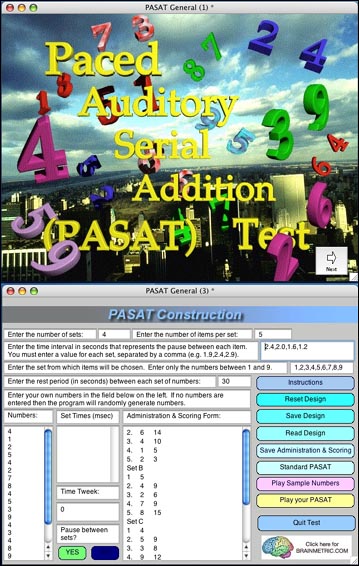Paced Auditory Serial Addition Test (PASAT).
The PASAT is a test of sustained attention. Subjects listen to a series of numbers and are requested to add consecutive pairs of the numbers as they listen. The test requires a high level of attention, especially if the numbers are presented quickly. This program allows you to make your own PASAT and record it on an audiotape for administration. You can also use the computer program for administration. You have complete control over the number sequence, time intervals and the number of sets you wish to present. Of course, the computer is extremely accurate when designing the set. It is far more accurate than older PASAT tapes made with analog recording equipment. The program also generates the text file you will need to record responses.
Norms for the "Standard" PASAT
The Standard form consists of four sets. Each set has 50 numbers. The time intervals for each set are 2.4, 2.0, 1.6 and 1.2 seconds. After you administer the standard form, you can use the program to calculate normative standard scores. These normative scores were constructed from a meta-analysis of three normative studies of the PASAT. The findings of these studies were used to form composite norms using regression procedures. The studies included a composite sample of 1,488 normal volunteers. The norms were designed to generate two T scores, one based on the composite sample without any demographic corrections, and a second T score based on an Age correction.
Price: $199
| Check these resources for information about the PASAT norms and interpretation of the test scores. |
 |
|
 |
This book includes an extensive review of neuropsychological tests, including a section on the PASAT Test. |
 |
This book reviews a number of tests and includes a section on the PASAT.
|
| |
|
| |
|
|
 |




